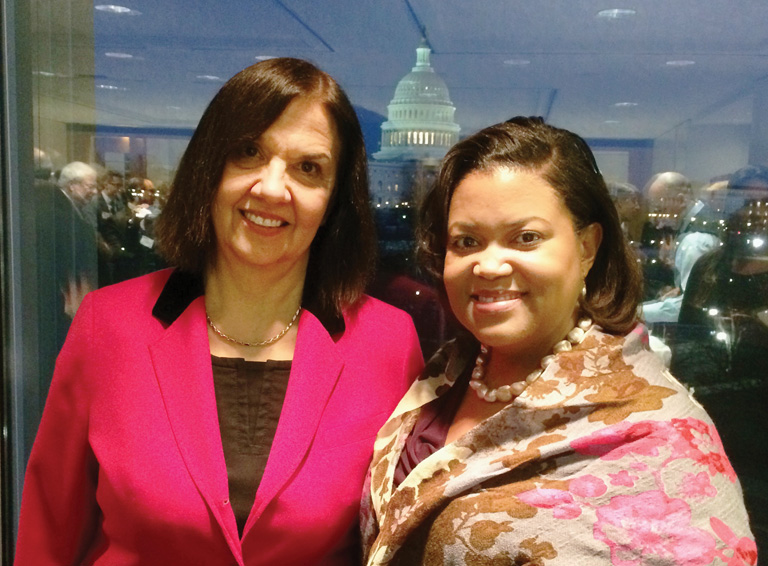We sat down with chair Cheryl LaFleur and commissioner Colette Honorable as their extraordinary time as the only members of the FERC continues.
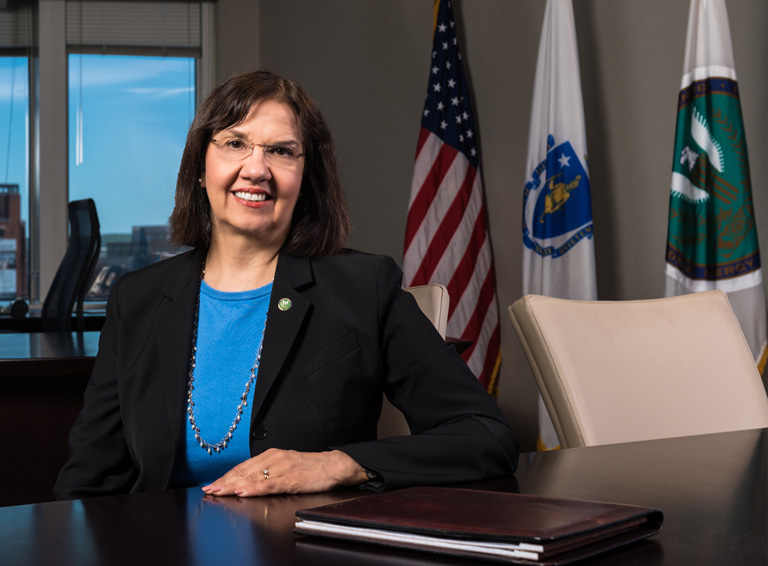
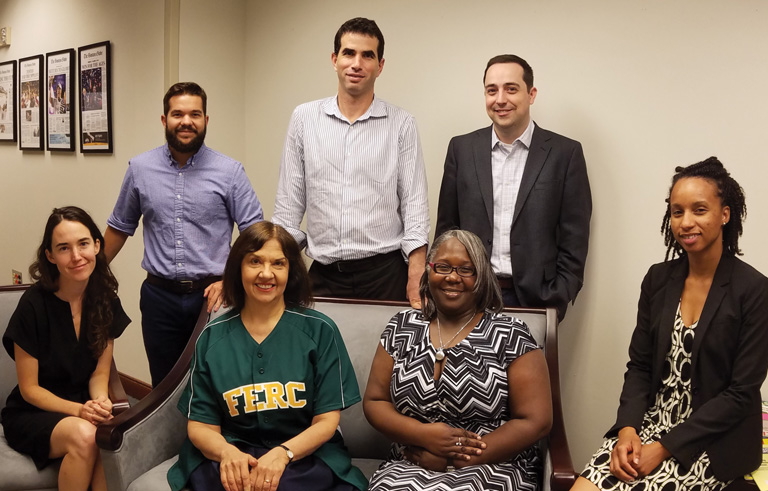
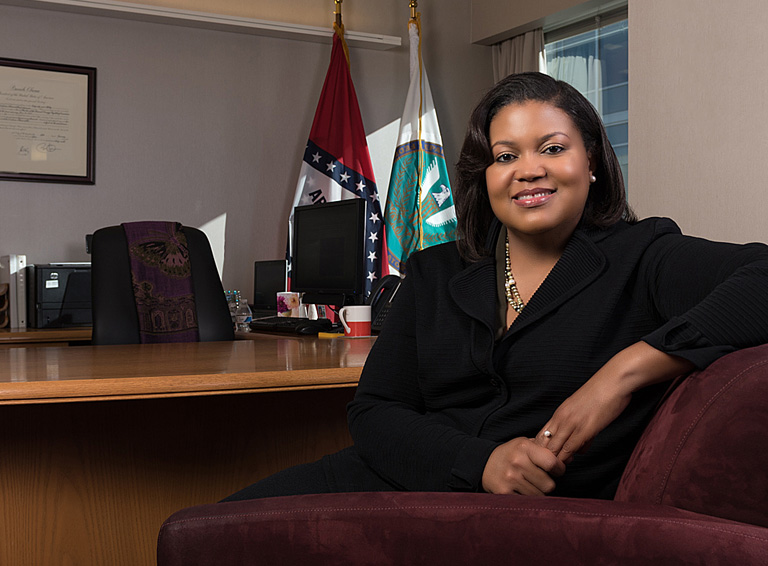
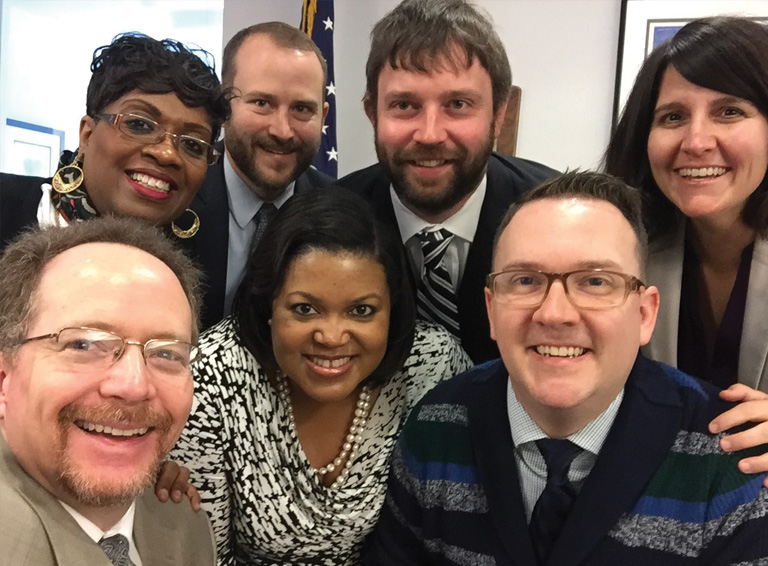
In May, President Donald Trump announced the nomination of two new commissioners to the Federal Energy Regulatory Commission. The Senate must approve the nominees, who are NARUC President Rob Powelson and Neil Chatterjee, energy policy advisor to United States Senate Majority Leader Mitch McConnell of Kentucky.
Since early February, FERC has faced an unprecedented freeze of certain major agenda items when one of its three remaining commissioners resigned, leaving just two. The agency usually has five commissioners, and typically needs a quorum of at least three to approve certain projects. FERC has never been in a situation in which it had just two commissioners until this year.
PUF's Pat McMurray met with Acting Chairman Cheryl LaFleur and Commissioner Colette Honorable to discuss this historic time at FERC.
FERC Acting Chairman Cheryl LaFleur
PUF's Pat McMurray: What was it like when you came here, and what it's been like for the past seven years?
Commissioner LaFleur: It's really been a wonderful experience. I've been in the energy field a long time, since 1986, but when I got the call from the White House to be considered for the commissioner position in 2009, it was a surprise.
I had not even known there was a vacancy, so this is a little different than how it usually happens. When I reflect on how many changes have happened in my life in the last eight years since then, the wonderful experience being on the commission and living in D.C., and all the people I've met all around the country, it has been an unbelievable opportunity.
When I arrived here, I joined a full commission. We had four sitting commissioners, and I became the fifth. Jon Wellinghoff was chairman, and the issues that were top of mind then were demand response and transmission planning, working on the order that later became Order 1000.
There were many other issues as well, but those were two of the big ones. Since that time, I've seen and worked with seven other commissioners, and have seen a lot of changes in the industry as well as at the commission.
PUF's Pat McMurray: If you had to name the top three issues that you've dealt with over these years, what would they be?
Commissioner LaFleur: Iusually start with reliability and grid security. That's been one of my top priorities from the day I walked in.
We got this authority in 2005, certified NERC as the Electric Reliability Organization a couple of years later, and when I got here, a lot of the work was still finalizing the baseline standards that were developed in response to the 2003 blackout - tree trimming, relay setting, and so forth.
In recent years, our work has evolved to focus more on the emerging issues of cybersecurity - physical security, geomagnetic disturbances, electromagnetic pulse. That's been a very important body of work.
Second, the work on the competitive wholesale markets in the electric area has been another one of my big priorities.
We've seen a lot of changes in the markets driven by the changes in the resource mix in the country. The growth of natural gas, increased deployment of renewables and the environmental regulations that have taken effect in the last several years have really impacted the resource mix. We have done a lot of work to make sure that the markets fairly compensate the attributes of all types of resources, including demand response, variable resources, and storage. We have also worked to make sure that the resources that are counted on during times of system scarcity are appropriately compensated.
Third are the infrastructure cases, particularly involving gas pipelines and liquefied natural gas. With the growth of domestic natural gas, much of our production is coming from a different part of the country than it had previously, so we've seen a tremendous amount of infrastructure buildup.
To give an example of how this change is impacting our infrastructure work: when I had my hearing in 2010, we were still focusing on LNG import applications, and I prepped for questions on all the import applications at my confirmation hearing. That seemed to turn on a dime, and in recent years we have had many applications to export with all the attendant pipeline infrastructure.
PUF's Pat McMurray: The White House has declared it intends to nominate two new commissioners. There are only two commissioners sitting right now, and there is no quorum. A quorum would be three, of the five commissioner positions. Is that right?
Commissioner LaFleur: That's correct.
PUF's Pat McMurray: One of the things that I've noticed recently is, with the lack of the quorum, that many stakeholders in the industry have been anxious.
Commissioner LaFleur: Without the quorum, we did delegate some authority to staff, primarily to take actions in certain cases to protect customers and to make sure nothing went into effect by operation of law if it needed a commission order.
But, other types of things, including infrastructure projects, mergers, major changes in market rules, and hydro licenses, could not be finalized without a quorum. Normally we issue about a hundred orders a month at the Commission level, and we've issued only a fraction of that under the new delegated authority.
So, many people are eager for us to regain a quorum and be able to deal with their applications. They have commercial reasons, deadlines that they're waiting for orders, reliability, or customer service reasons that they need action from the commission.
We have a clear focus and mission, which is interstate and wholesale energy of all types, but that covers quite a bit.
PUF's Pat McMurray: What do you anticipate once you have a quorum? What's number one on your list?
Commissioner LaFleur: Well, there are a couple bodies of work that we've been preparing since I've been Acting Chairman. The first is there are many draft orders that are drafted for the commission to take up.
We will have to come up with an organization and prioritization of those, triage them if you will, because we can't expect somebody to come in and do several hundred orders on the first day. So, we are working through that to try to make sure we have a good grasp on what's been backed up, what's time sensitive and so forth.
Second, we have quite a large number of rulemakings of different sorts. Everything from proposed changes in market rules, like our price formation proposals, to a notice of inquiry on how to deal with master limited partnerships in oil and gas pipeline rates. We also have a notice of inquiry on the terms of hydro licenses, and some pending reliability standards, and many other things like that. In those cases, we're trying to ensure we've done the homework and can shape what the policy options are for the new FERC 2.0 when they get here. That's another whole body of work besides the actual draft orders.
PUF's Pat McMurray: FERC is always mentioned as one of the top places to work in the federal government and for some reason this agency always gets that kind of commendation. Why is that?
Commissioner LaFleur: This is my first government job, so I have nothing to compare it to. But first, I think it's because FERC has a clearly defined mission. We know what our job is. We know what we're about. I think that we're a very good size.
We're large enough to have a superb body of employees, but small enough that people know each other. The people doing the work know the leadership. There are some huge departments in Washington that have much bigger management issues, I'm sure, than FERC. So, I think we're very focused.
Second, we are an independent agency. We're bipartisan. We've always worked well together. We're not overtly political, and I think there's a long history of collegiality and camaraderie among the commissioners.
Third, we have excellent employees. I worked with FERC on the outside in my past life, so I knew it to be an excellent agency, but I saw it much closer up when I got to see the people here.
When I was in private industry, we heard a lot about the aging of the workforce. I know the average age in the business unit that I oversaw was forty-seven. We had an aging workforce of a lot of baby boomers.
We have a real mix here. We have a lot of employees who have been around for decades and know all the background of everything, and have amazing perspective. But we're one of the top agencies in Washington for people under thirty, in terms of the percentage. We have a great mix of employees.
And finally, I think we have a family-friendly culture. We have good policies, and that's something that is always mentioned in our surveys. That's not because we don't expect people to work very hard, but hopefully we allow some flexibility.
PUF's Pat McMurray: Is there such a thing as a typical day at FERC?
Commissioner LaFleur: Yes. We're back to typical, when we have a quorum. When I hire people in my office, I think about two thirds of the job is in some way related to the orders that we consider, the issues that we vote on.
Typical would be working with staff to frame issues and discuss how to deal with matters that come before us, reading and working on orders, and writing separate statements. That takes a good bit of our time.
Another thing that takes time is that we have a lot of meetings - almost every day we have some combination of internal meetings with staff and other commissioners and external meetings. We have people trekking in from all parts of the energy world - regulated companies, state officials, environmental groups - people who have an interest in issues before us. We do a lot of outside meetings.
Third, I do a fair amount of public speaking and travel. I try to get to different regions of the country when I can, and that's the last big part of the job, really. I think every day is a blend of those: some meetings, time with my team in between working on orders or things that are pending.
PUF's Pat McMurray: What have you done that's the most fun at FERC?
Commissioner LaFleur: What I have enjoyed the most is all the people I've gotten to know. I really thought when I was in New England that I knew a lot of people. I was so concerned about having backups of backups of my Rolodex. (I know people don't know what a Rolodex is anymore, I guess you would call it a contact list.)
But I know so many more people now, and I feel like I could just kind of parachute into any state capital city and know someone there, whom I'd actually worked with, which is wonderful.
So, as to fun experiences, when I did the Energy Bar Association funny dinner, I did Lady Giga, which is like Lady Gaga except named after a gigawatt. I dressed up like Lady Gaga and did an energy themed entertainment event. That was definitely fun. That was different. Another thing that was very cool is I threw out a first pitch in Kansas City at a Royals game and it was the year they won the World Series.
There have been some unusual events, but I love meeting with people, and there's a lot of that on this job.
PUF's Pat McMurray: FERC is known to be bipartisan. Is the Commission a model in some ways for a way in which to build a relationship with the other side?
Commissioner LaFleur: I do think we have worked in a bipartisan fashion. We certainly don't always agree on everything, either across the aisle or even just commissioner by commissioner of the same party.
And I think the fact that we have relatively few dissents reflects the ability of the staff to find the middle, the compromise, the sense of where the commission is.
One of the things that helps is that we're expressly bipartisan, so we are a bit unusual right now with just two Democrats. Normally you have only one commissioner changing each year, so there's typically a lot of continuity. We process orders over a long time, and people come and go, but there's a continuity in the work that we're doing.
I also think that we decide cases by the facts and the law, and not by ideology. So, if you are deciding by the record, that makes it easier to discuss the issues because you're discussing facts grounded in a shared understanding of the case.
FERC Commissioner Colette Honorable
PUF's Pat McMurray: You're here at a very historic time for FERC, when there are only two commissioners. The full complement is five commissioners. Three commissioners would constitute a quorum, which legally you need to transact business. What's it been like working without a quorum?
Commissioner Honorable: It's an interesting time. Some have thought that maybe we are twiddling our thumbs and that certainly isn't the case. It's been very busy, but it's been a different sort of busy.
By way of context, if you think about the number of orders that FERC issues in a year, even with a full complement of commissioners, the commissioners themselves only issued a third of those orders.
Even under preexisting delegated authority, our staff, which is very capable and experienced, issued about two-thirds of those orders. So, before we lost the quorum, we issued an order delegating authority to staff in limited circumstances.
It gives them additional authority to hear uncontested settlement agreements and make decisions about those. Also, to make decisions on certain uncontested waiver requests. It extends the time in certain circumstances such as with certain mergers or acquisitions for the commission to act.
We felt we could authorize them to suspend tariffs and set matters for hearing, and to basically maintain the status quo in most circumstances. But we also wanted to vest them with authority where we felt we could under the law, to hear certain matters that were uncontested.
PUF's Pat McMurray: Is the key word uncontested?
Commissioner Honorable: That's an important part of it because we recognize that the buck stops with us, the commissioners. We certainly didn't want to put our staff in the position of hearing matters that were contested or that we didn't believe we had the authority to delegate to them.
So, I believe that folks in the sector would find that we were very careful with the issuance of this order delegating authority, and it was very limited.
PUF's Pat McMurray: What comes up to your level and chairman LaFleur's level? Is it only the contested issues?
Commissioner Honorable: No, it's not only contested issues. Those matters are still being prepared and orders are still being drafted for our review.
We still receive the orders - we just can't issue them. So, we have quite a backlog to consider. We receive matters of all sorts regarding mergers and acquisitions, issues associated with the operations of markets, enforcement issues, and certain reliability matters. We also receive a number of contested matters.
I should also mention that so much of the work that our administrative law judges carry out under the direction of our Chief Administrative Law Judge Carmen Cintron is still continuing.
They are able to have hearings and complete a full record, issue orders and the like. We have a number of ways in which our work here is still continuing.
Our enforcement bureau is still very active and working diligently on ensuring that markets are free from manipulation. Our work in the Office of Electric Reliability is continuing.
Our work with regard to oversight of energy infrastructure security is also continuing.
I could go on and on. But there are a number of issues that we can't hear, and the commissioners can't decide until we get a quorum.
I think the one that gets the most attention in the public domain is our work regarding special projects. We hear applications for projects such as hydropower facilities, interstate gas pipelines, and liquified natural gas terminals, but we cannot issue those orders until we get a quorum.
PUF's Pat McMurray: Do you hold open meetings?
Commissioner Honorable: No, we do not. In order to conduct deliberations regarding official commission business, a quorum is required and since we don't have one we're not able to have open meetings.
I'm really proud of our staff. So much of this work in the interim has fallen on their laps, so to speak. We've had a hydropower workshop in the last few weeks. Our staff has prepared an agenda for a two-day technical conference, focusing on the operation of wholesale energy and capacity markets and the intersection with the development of state energy policy.
I can assure you that it will be power packed. I want to compliment our team which put together an incredible agenda. We were able to offer input, but it will be led by our senior staff.
As you know, there are a number of very challenging issues associated with this growing tension, with the operation of markets and the work that states will continue to undertake in shaping their own respective energy futures. So I'm looking forward to the meeting.
[NOTE: This technical conference was held on May 2 and 3, 2017.]
PUF's Pat McMurray: FERC is one of the best places to work in the federal government, according to a poll I saw recently.
Commissioner Honorable: We have an incredible team of almost fifteen hundred employees here at FERC. They are our colleagues. And we are very proud of having won awards consistently for several years in a row now.
We have been ranked in the top five for the best places to work. I believe we're number four for mid-size federal agencies, and we are again in the top five for the best places to work for millennials.
That's really important in this work because it's very technical. So you need people who have the ability to stick with a project over a period of time, because these issues are very challenging.
But I have to speak for a moment about the strong collegiality of the commissioners and their team members who work here. It's very important to me, and I know that it is for my colleagues, that we work well together.
We don't always agree, but it's important that we remain agreeable even when we aren't all on the same page. We work very hard, and I want to compliment Chairman LaFleur and also my former colleagues, who really demonstrated that it's so important that we work well together.
The simple fact is so much of our work has nothing to do with politics. Yes, we arrive here through what some may call political means. We are appointed by a president who is of a particular party and confirmed by the Senate.
But most of our work we can do without referencing a political affiliation or an ideological perspective. We can work on infrastructure investment that has neither a Democratic or Republican slant, nor independent for that matter. I think we can all gather around that and focus on what's important to ensure that we have the necessary infrastructure.
We can also make sure that fuel shows up when it's needed and that energy is moving the way that it needs to when it's needed.Our work regarding reliability and resilience of the grid, certainly knows no political affiliation. We all want the grid to be strong and secure. We are all focused on affordability.
The difficult thing is the fact that we are all leaders and we do tend to come here with some experience in the sector. So, we may have a certain idea or two about how that should be done. Or how that end goal could be accomplished.
That's where the hard part comes in, so it's important that we protect this precious and valuable asset that we have in our ability to work together.
PUF's Pat McMurray: Are there some big decisions or big issues that stand out as landmarks for you?
Commissioner Honorable: There are probably several. One is our work with regard to transmission as it's evolving. It's very significant as it relates to infrastructure development. I'm really proud of that work.
Our work with regard to market oversight is significant. We've been working on a price formation effort that has really driven our approach to looking at operator action, for instance, and ensuring that markets are not only operating as intended, but that we are providing market participants with certainty and transparency and building confidence in markets.
The [May 2 and 3] tech conference is yet another part of that ongoing work that we're undertaking with regard to market oversight and operation. I'm also really proud of our work with regard to making room for renewables and advancing technologies.
Over the course of my tenure here, we've been very focused on ensuring that, in the transmission planning and cost allocation process, we are trying to improve the timeliness of how projects are moving through the queue. And, focusing on why we're having a lengthier time building the necessary transmission.
But I'm proud also of our work in making room for storage and especially proud of our Notice of Proposed Rulemaking as well as the eventual issuance of the energy storage policy statement.
That really focused on directing the removal of barriers for storage to participate in markets.
PUF's Pat McMurray: On a lighter note, are there humorous moments that you look back on?
Commissioner Honorable: I think my colleagues here on Team Honorable would share with you that we love to find humor in our day-to-day work because at times it can be technical.
I think humor is important not only in laughing at a situation, but also in laughing at yourself from time to time. And I've enjoyed getting to know my colleagues better - my commissioner colleagues, and the men and women who work here at FERC.
Norman Bay, who sadly has left the agency, when we would visit we just would laugh about things so loudly at times. I learned a lot about him and the sense of humor that he has.
Tony Clark and I sat next to each other in the hearing room and the commission meeting room. He's a dear friend. I recall that when he left, I gave him a mug with a picture of Hillary Clinton. And it said that we were stronger together. I talked about the fact that no matter who we voted for, we're stronger together and then gave him the mug.
But he took it and he placed it behind his name placard so no one could see it. And I told him, "No you've got to display that mug."
PUF's Pat McMurray: When you leave do you have a dream, a place you'd like to go? Is there something you'd really like to do that you haven't been able to do yet in your career?
Commissioner Honorable: No. This has been a dream job. I love coming to work every day. I love this job. I've been blessed to be able to bring my best efforts to a place and work with men and women from all walks of life to produce an excellent product.
The work we do here at FERC is so important and it's been an honor to do it here. And I'm focused on today. I'm focused on this week. Throughout the week I'm looking at, what are my objectives and what do I want to accomplish.
Focusing on ensuring that even though we lack a quorum, much of our work will and must continue, and I'm doing what I can to support that work. I still enjoy strong support from both the Democratic and Republican Senate leadership, along with the environmental community and people in the electric and gas sector.
I'm a bit of a unicorn right now to have the decisions that I've issued here and worked so well with so many people in this sector. It really is a dream to carry out this work.
Category (Actual):
